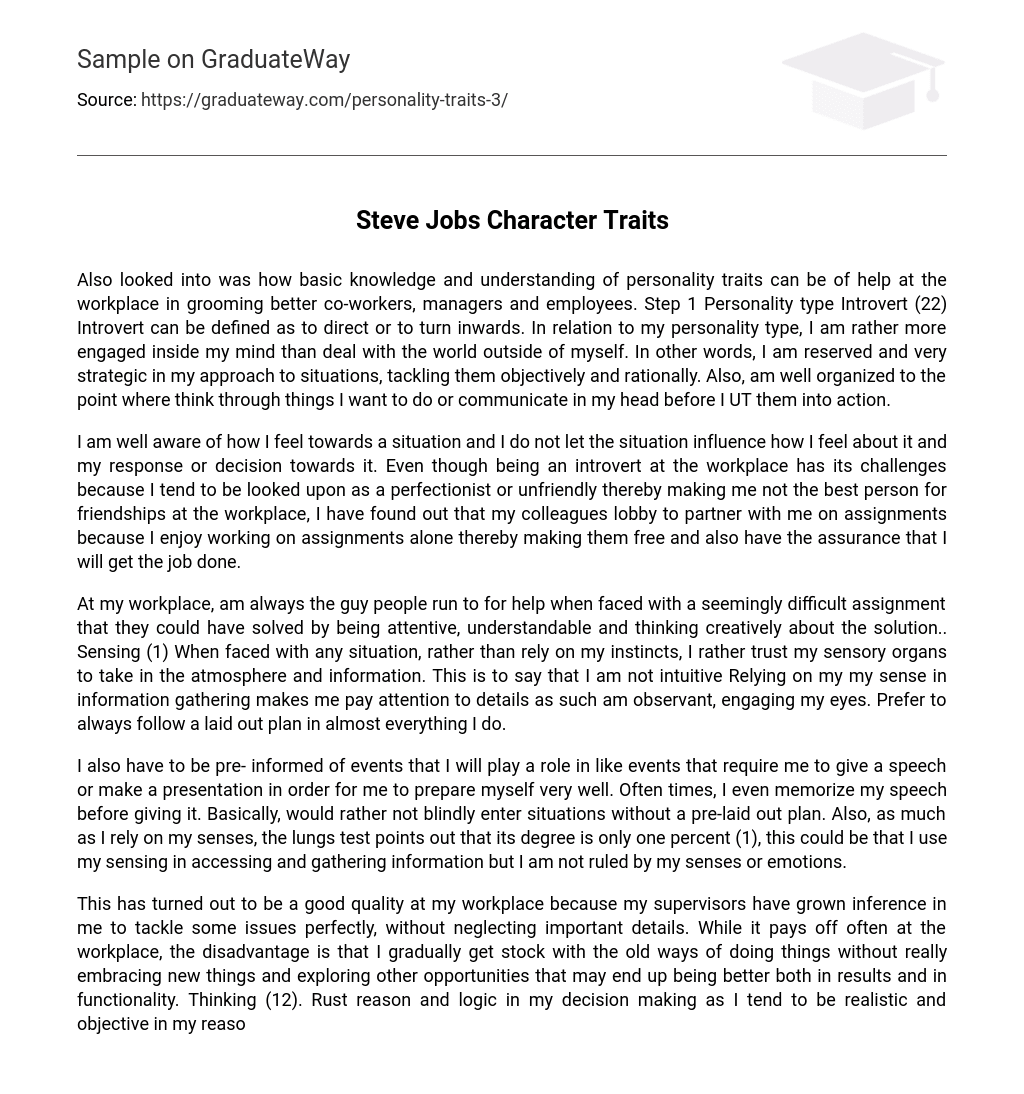Understanding personality traits is crucial for enhancing relationships among coworkers, managers, and employees in the workplace. The initial stage centers on introverts (22) who typically possess an internal focus. As an introvert myself, I adopt a strategic and objective approach to situations. Additionally, I excel in organizational abilities and prefer to thoughtfully evaluate my actions and communication before putting them into action.
Despite the challenges of being introverted in the workplace, I am able to maintain control over my emotions and remain unaffected by external factors in regards to how I feel about a situation and the decisions I make. This can sometimes lead to others perceiving me as a perfectionist or unfriendly, hindering my ability to form close friendships at work. However, I have discovered that my colleagues actually prefer working with me on projects. This is because I excel at working independently, giving them more freedom while also ensuring successful completion of tasks.
At my workplace, I often come across people who need help with difficult tasks that could have been solved by being more attentive, understanding, and thinking creatively. To tackle this problem, instead of relying only on intuition, I choose to rely on my senses to absorb the environment and information. Essentially, I am not solely dependent on instinct. By using my senses to gather information, I become focused on details and observant through my eyesight. In almost every area of my life, I prefer following a structured plan.
I prefer to be notified beforehand about events where I have a role, like giving speeches or making presentations. This allows me to adequately prepare and sometimes even memorize my speech in advance. I would rather avoid unprepared situations. Despite relying on my senses, the lungs test indicates that they only contribute 1% to my decision-making process. This implies that although I gather information through my senses, it is not solely influenced by them or my emotions.
At my workplace, my supervisors have developed confidence in me to handle issues effectively, paying attention to key details. While this has proven beneficial, the downside is that I tend to stick to established methods without embracing new opportunities which could potentially yield better results. I rely on reason and logic when making decisions, prioritizing objectivity over subjective emotions. The Jung typology test categorizes me as a thinker who makes fair and unbiased decisions based on predetermined rules of behavior. I strive to remain impartial and not let others’ opinions sway my judgment.
I highly value logic and have a keen eye for inconsistencies. During a recruitment interview for my company, I realized that my cousin was one of the candidates to be interviewed by me. Recognizing the potential bias in my judgment, I promptly informed my superior and requested to be removed from conducting the interview. However, my superior refused and expressed trust in my ability to make the correct decision. Despite this, I proceeded with the interview and made it clear to all applicants that their selection would be determined solely by their performance and qualifications.
I surprised some of my colleagues by not choosing my cousin for the job because he lacked the qualifications. Many people praised my honesty, but some viewed me as self-righteous. In Nigeria, where corruption is rampant, this behavior is not typically applauded by those who judge (67). I prefer things to be organized and carried out in an orderly manner. I also value following established rules and adhering to schedules. I would rather have things completed and resolved than left unresolved. I prioritize deadlines and strive to meet them rather than procrastinate. Procrastination is not something I engage in frequently. I often struggle to form connections or accept individuals with personalities opposite to mine. Nonetheless, when I do, I discover that we are actually compatible. This behavior has served me well in my workplace as I always aim to balance the accounts every Friday before leaving for the weekend, whereas some of my colleagues procrastinate and fail to even present their books on Monday.
The SITS is a duty fulfiller. I am an introvert who interprets situations and gathers information using my sensory organs. I have a literal and concise approach and deal with things logically and rationally. As a duty fulfiller, I set goals, work consistently to achieve them, and am well organized and hardworking.





